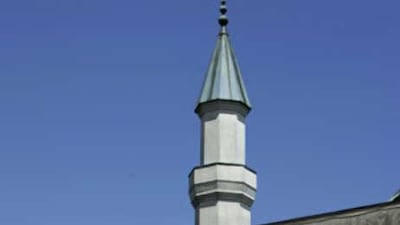Geneva // A campaign seeking to ban the building of minarets in Switzerland will gather pace today with the submission of a petition calling for a referendum on the subject. A member of the right-wing Swiss People's Party is due to present 114,000 names collected over the past year to the country's parliament in Bern. Ulrich Schluer, the former member of parliament who is spearheading the initiative, said the minaret was a symbol of the desire of Muslims in Switzerland to live under their own separate legal system. Switzerland has more than 300,000 Muslims, including many who fled tensions that erupted in the former Yugoslavia in the early 1990s. Local authorities have in the past blocked the construction of minarets, but if passed the proposed referendum would impose a nationwide ban. This hostility to the Muslim population is part of a wider unease among right-wingers over the growth in numbers of foreigners in the country. Non-Swiss make up more than 20 per cent of the country's population of 7.5 million, although about one-third of those were born in Switzerland. Mr Schluer, a newspaper editor, said there were now "two different orders of law in our country", one for Muslims and another for the rest of the population. This, he said, was shown by the "thousands" of cases of forced marriages within the Muslim population. "This is just one example. It is against our law and you cannot maintain in our country two different laws," he said. "The minaret is a symbol of a different order. Our national law is the law of a democratic process; it's not imposed by a foreign power. It's valid for everybody who decides to live in our country. "Wherever you go to live, whether in Turkey or in Abu Dhabi, you have to accept the order that exists there." Mr Schluer said he was not attempting to stop Muslims from worshipping freely or calling for existing minarets in Switzerland, of which there are thought to be three, to be torn down. "We do not operate against the Muslim community, but I think we have to discuss this problem freely and openly," said Mr Schluer. Switzerland is known for its large number of referendums, some of which are at national level, others based within the country's administrative divisions, or cantons. A Swiss citizen can propose a referendum and have it voted on by the country if they can collect 100,000 signatures. "Every day we had 100, 200, sometimes 500 signatures coming in by post. That shows that the subject of this initiative has a lot of acceptance in the population," said Mr Schluer. The Swiss People's Party has courted controversy in the past with anti-immigration advertising campaigns described by some as racist, although party officials have rejected these claims. Although Mr Schluer is on the organisation's 115-member central committee, the party, which achieved a 29 per cent share of the vote in national elections in October, has so far not taken a stance on the minarets issue. "We know some of our politicians in parliament are for this initiative. On the other hand, we do have representatives who are saying it goes too far," said Alain Hauert, a spokesman for the party. It could be three years before the referendum is voted on. In the meantime, it is scheduled to be considered by the seven-member Swiss Federal Council, the country's executive, and debated in the nation's two chambers of parliament. At the Islamic Centre in Geneva, a small, nondescript building a few minutes' walk from Lake Geneva, about 100 men, mostly from north Africa, come each day to pray. Among the regular worshippers at the mosque - one of about 100 in the country - is Essa Ponssen, 34, who came to Switzerland as a child from what is now the Czech Republic and converted to Islam seven years ago. He said there was "a fear" of Muslims in Switzerland. "They think we want to dominate. If they see something big and it is loud, they will feel we are overtaking their space and religion," he said. "They fear also because people are going less and less to church and quite a few empty churches have been given to Muslims. I've had remarks when I wear my djellaba. They say, 'Why don't you go home?' although most people, when they see how you behave, change their minds." There are six mosques in Geneva, one of which has a minaret, although Mr Ponssen said worshippers were not allowed to use it for the call to prayer. He said many Muslims in the city were reluctant to be identified by their religion, possibly because they feared being negatively stereotyped. "If you say 'assalamu alaikum', they don't want to say 'wa alaikum assalam'. They don't want to show their religion because of the way the media is talking about Muslims," he said. Mr Ponssen said Muslims should not make a fuss about the minarets issue. "I don't see the need for the use of the minaret," he said. "It's part of the mosque, but I don't really see the need to have one. I appreciate that they let us build the mosque and have our activities." Christoph Schumann, an academic at the Islamic Science and New Oriental Languages Institute at the University of Bern, has a sense of déjà vu when he considers Switzerland's debate about Muslims. The arguments about the building of mosques and minarets mirror those that took place in his home country of Germany, which had waves of Islamic immigration a decade ago. He said, however, that Muslims in Switzerland had a lower profile and since many of the country's Muslims came from the former Yugoslavia and were more secular than their Turkish counterparts, their presence was less likely to have an effect on the nature of society. "No part of the Muslim community is big enough to hang out the flag and dominate part of a city," he said.
* The National


